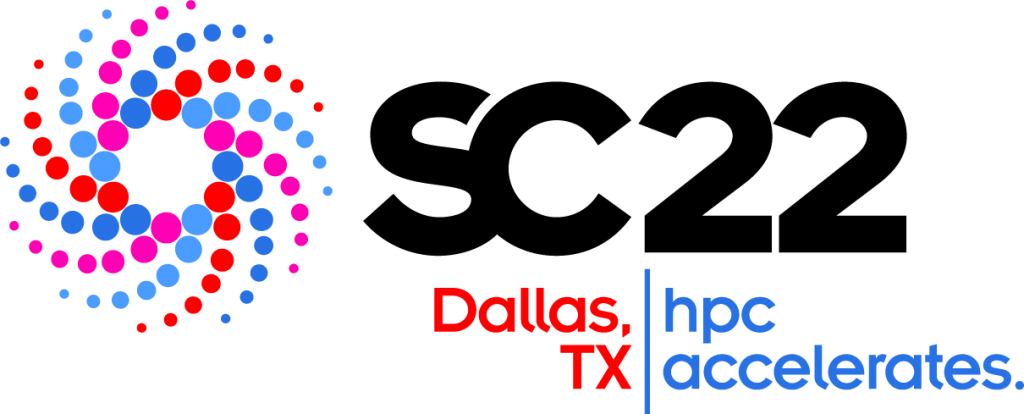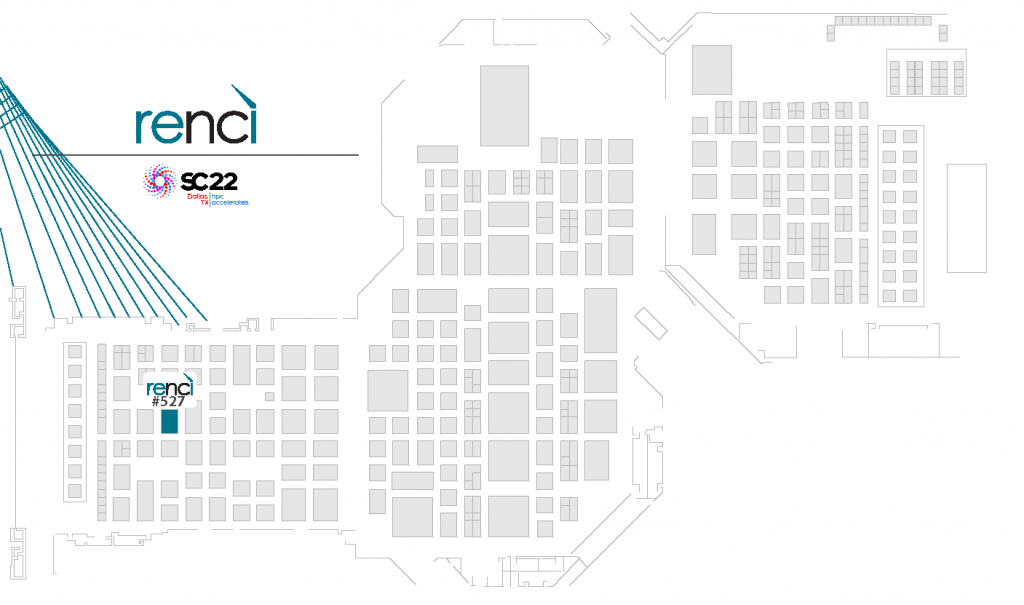
Each year, the Supercomputing conference provides the leading technical program for professionals and students in the HPC community, as measured by impact, at the highest academic and professional standards. The program is designed to share best practices in areas such as: algorithms; applications; architectures and networks; clouds and distributed computing; data analytics, visualization, and storage; machine learning and HPC; performance; programming systems; system software; and state of the practice in large-scale deployment and integration.
Visit the RENCI at Booths (#527) and (#4753) at SC22 to learn about our collaborative research projects and cyberinfrastructure efforts aimed at helping people use data to drive discoveries.
- The Network Research and Infrastructure Group focuses on developing new types of cyberinfrastructure for domain sciences. NSF-funded projects from this team include CI Compass, PosEiDon, FlyNet, and FABRIC, which recently moved to Phase 2 of its timeline.
- The iRODS Consortium brings together businesses, research organizations, universities and government agencies to ensure the sustainability of iRODS, an open-source data management software that is continually being developed out of our institute.
- RENCI researchers help build data ecosystems and platforms for NIH-funded projects such as BioData Catalyst. HEAL, and Translator. Additionally, they develop new data science tools and methods. such as HeLX.
- RENCI staff support multiple national data science community initiatives, such as the South Big Data Hub and the National Consortium for Data Science (NCDS).

A full schedule of sessions featuring our researchers at our booth can be found below. All times are in CT.
Look for updates about our activities at SC22 on social media!
11:00 – 11:30
iRODS Development and Testing Environments (v8)
Alan King (iRODS)
Description: iRODS Build and Test continues to evolve. Testing a distributed system is hard and this talk will describe the eighth generation of our efforts to do it well. This talk will include containers, Python, and no Groovy.
11:30 – 12:00
FABRIC Update
Ilya Baldin (RENCI)
Description: FABRIC (FABRIC is Adaptive ProgrammaBle Research Infrastructure for Computer Science and Science Applications) is an International infrastructure that enables cutting-edge experimentation and research at-scale in the areas of networking, cybersecurity, distributed computing, storage, virtual reality, 5G, machine learning, and science applications. This talk will give an update and demo of FABRIC capabilities.
1:00 – 1:30
iRODS: Consortium and Technology Update
Kory Draughn (iRODS)
Description: This talk will cover the iRODS Consortium’s updates from the past year and plans for 2023.
2:00 – 3:00
PoSeiDon: Platform for Explainable Distributed Infrastructure
Ewa Deelman (USC), Anirban Mandal (RENCI), Prasanna Balaprakash (ANL), Mariam Kiran (LBL), Hongwei Jin (ANL), George Papadimitriou (USC), Cong Wang (RENCI), Krishnan Raghavan (ANL), Patrycja Krawczuk (USC), Komal Thareja (RENCI)
Description: DOE science workflows are increasingly being executed on federated services infrastructures that are complex and managed by different organizations, domains, and communities. Hence, the operators of these infrastructures and the scientists that use them have limited global visibility and consequently incomplete understanding of the behavior of the entire set of resources that science workflows span. This limited visibility makes it extremely difficult to predict performance, detect and diagnose anomalies (e.g., network congestion, I/O bottlenecks) in the infrastructure and to understand their impact on the scientists’ workflows. PosEiDon will provide an integrated platform consisting of algorithms, methods, tools, and services that help facility operators and scientists improve the overall end-to-end science workflow by (1) predicting the performance of complex workflows; (2) detecting and classifying infrastructure and workflow anomalies and “explaining” the sources of these anomalies; and (3) suggesting performance optimizations. This presentation will provide an overview of the recent accomplishments for the PoseDon project.
3:00 – 4:00
FlyNet: An ‘On-the-fly’ Deeply Programmable End-to-end Network-Centric Platform for Edge-to-Core Workflows
Michael Zink (UMass), Anirban Mandal (RENCI), Ewa Deelman (USC), Prasad Calyam (Univ of Missouri), Eric Lyons (UMass), George Papadimitriou (USC), Alicia Esquivel Morel (Univ of Missouri), Cong Wang (RENCI), Komal Thareja (RENCI), Chengyi Qu (Univ of Missouri)
Description: Unmanned Aerial Vehicles (also known as drones) are becoming popular in the sky. Their application reaches from hobby drones for leisurely activities to life-critical drones for organ transport to commercial applications such as air taxis. The safe, efficient, and economic operation of such drones poses a variety of challenges that have to be addressed by the science community. For example, drones need very detailed, close to the ground weather information for safe operations, and data processing and energy consumption of drones need to be intelligently handled. This project (FlyNet) will provide tools that will allow researchers and drone application developers to address operational drone challenges by using advanced computer and network technologies. This project will provide an architecture and tools that will enable scientists to include edge computing devices in their computational workflows. This capability is critical for low latency and ultra-low latency applications like drone video analytics and route planning for drones. The proposed work will include four major tasks. First, cutting edge network and compute infrastructure will be integrated into the overall architecture to make them available as part of scientific workflows. Second, in-network processing at the network edge and core will be made available through new programming abstractions. Third, enhanced end-to-end monitoring capabilities will be offered. Finally, the architecture will leverage the Pegasus Workflow Management System to integrate in-network and edge processing capabilities. In this presentation, we will provide an overview of the FlyNet project.
11:00 – 11:30
FABRIC Update
Paul Ruth (RENCI)
Description: FABRIC (FABRIC is Adaptive ProgrammaBle Research Infrastructure for Computer Science and Science Applications) is an International infrastructure that enables cutting-edge experimentation and research at-scale in the areas of networking, cybersecurity, distributed computing, storage, virtual reality, 5G, machine learning, and science applications. This talk will give an update and demo of FABRIC capabilities.
11:30 – 12:00
Rspace-iRODS Integration: Enhancing Institutional Research Data Management
Mehoriz Ahmed (ResearchSpace)
Description: ResearchSpace, provider of the RSpace electronic research notebook and sample management system, is collaborating with iRODS, a data discovery, workflow automation, secure collaboration, and data virtualization platform. The integration with iRODS will ensure the integrity of links between RSpace and the wide range of resources it connects with via the virtualized file tracking and meta-data management enabled by iRODS.
1:00 – 1:30
Protocol Plumbing: Presenting iRODS as WebDAV, FUSE, REST, NFS, SFTP, K8s CSI, and S3
Terrell Russell (iRODS)
Description: The open source iRODS (Integrated Rule-Oriented Data System) data management platform presents a virtual filesystem, metadata catalog, and policy engine designed to give organizations maximum control and flexibility over their data management practices and enforcement. Since iRODS defines its own RPC API and protocol, interoperability with other software has always lagged new server features and functionality. In the last few years, the iRODS Community has been working on multiple ways to present the iRODS protocol more conveniently to other software.
2:00 – 3:00
CI Compass: The NSF Cyberinfrastructure (CI) Center of Excellence for Navigating the Major Facilities Data Lifecycle
Ewa Deelman (USC), Anirban MaNDAL (RENCI), Jarek Nabrzyski (UND), Angela P. Murillo (IU), Valerio Pascucci (Univ of Utah), Kerk Kee (Texas Tech), MATS RYNGE (USC), Karan Vahi (USC), Rajiv Mayani (USC), Nicole K. Virdone (USC), Ciji Davis (USC), Ilya Baldin (RENCI), Laura Christopherson (RENCI), Erik Scott (RENCI), Charles Vardeman (UND), Christina Clark (UND), Don Brower (UND), Mary Gohsman (UND), Joanne Fahey (UND), Steve Petruzza (Univ of Utah), Giorgio Scorzelli (Univ of Utah), Rob Ricci (Univ of Utah), Chaitra Kulkarni (Texas Tech)
Description: We will present the CI Compass project, which is a National Science Foundation (NSF) Cyberinfrastructure Center of Excellence, which provides expertise and active support to cyberinfrastructure (CI) practitioners at NSF Major Facilities in order to accelerate the data lifecycle (DLC) and ensure the integrity and effectiveness of the cyberinfrastructure upon which research and discovery depend. In this poster, we will provide an overview of the activities of CI Compass – (1) one-on-one engagements with different Major Facilities addressing specific CI issues and needs, (2) topical working groups that address common CI issues across the MFs, (3) community building activities like the CI For Major Facilities Workshops, webinars, etc. (4) a vibrant student program, and (5) disseminating the MF CI best practices through publishing of technical reports, surveys, technical notes, etc.
11:00 – 11:30
iRODS: Consortium and Technology Update
Kory Draughn (iRODS)
Description: This talk will cover the iRODS Consortium’s updates from the past year and plans for 2023.
11:30 – 12:00
FABRIC Update
Paul Ruth (RENCI)
Description: FABRIC (FABRIC is Adaptive ProgrammaBle Research Infrastructure for Computer Science and Science Applications) is an International infrastructure that enables cutting-edge experimentation and research at-scale in the areas of networking, cybersecurity, distributed computing, storage, virtual reality, 5G, machine learning, and science applications. This talk will give an update and demo of FABRIC capabilities.
1:00 – 1:30
iRODS Development and Testing Environments (v8)
Alan King (iRODS)
Description: iRODS Build and Test continues to evolve. Testing a distributed system is hard and this talk will describe the eighth generation of our efforts to do it well. This talk will include containers, Python, and no Groovy.



